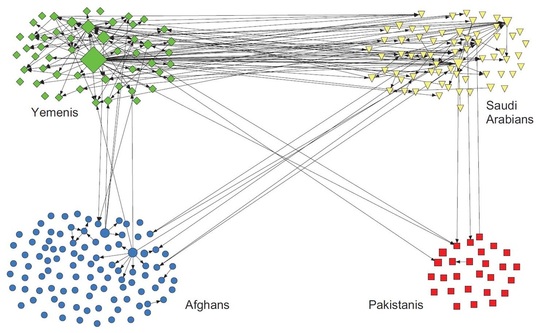Key words: Guantánamo, terrorism, social network analysis, power law, mosaic theory, learned helplessness, power-dependence, WikiLeaks
|
A new article, "Between Collaboration and Disobedience: The Behavior of the Guantánamo Detainees and Its Consequences", is now available online ahead-of-print in the Journal of Conflict Resolution. Based on a novel dataset created from Joint Task Force Guantanamo–authored memoranda on 765 detainees which had been purloined by Bradley Manning and published by WikiLeaks in April 2011, this study examines the behavior of the Guantánamo detainees in terms of collaboration and disobedience and how it influences their chances of getting a release recommendation. The centerpiece of the analysis is a network of incriminations between detainees. The figure below, which is taken from the article, shows a graphical representation of these accusations for a sample of detainees from the four largest national groups at Guantánamo (Yemenis, Saudi Arabians, Afghans, and Pakistanis). It indicates that Yemenis and Saudi Arabians heavily overcontribute regarding incriminating statements, whereas Afghans and Pakistanis undercontribute. In addition, the article reports that while a few detainees incriminate many others and many detainees incriminate only few others (the distribution of incriminating statements obeys a power law), the majority (62.6 percent) of all detainees do not incriminate anyone. Disobedient behavior does not affect the likelihood of getting a release recommendation, except for hunger striking, which has a negative effect. By releasing information, detainees don’t improve their own chances of getting release recommendations but impair those of the detainees they implicate. In the discussion at the end of the article, three different groups of detainees are identified (high-level-, low-level, and non-collaborators) whose behavioral patterns seem to follow distinct logics.
Key words: Guantánamo, terrorism, social network analysis, power law, mosaic theory, learned helplessness, power-dependence, WikiLeaks Comments are closed.
|
Categories
All
Archives
November 2023
|

 RSS Feed
RSS Feed